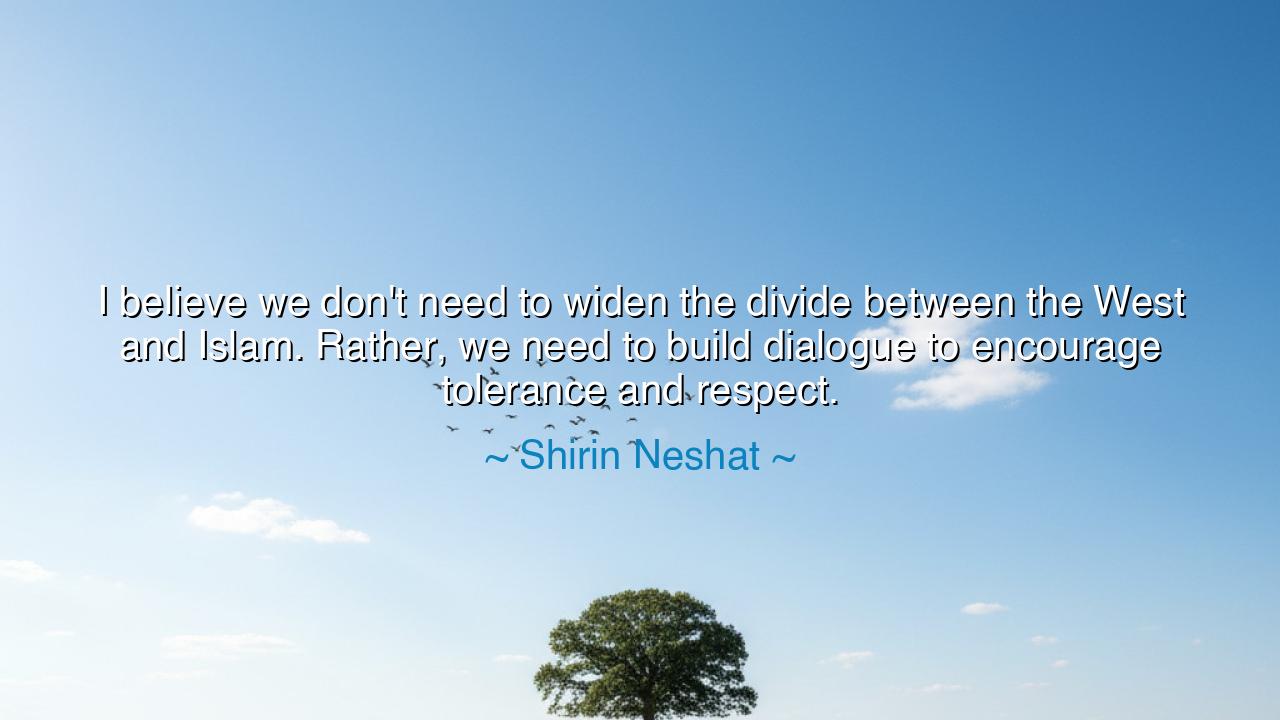
I believe we don't need to widen the divide between the West and
I believe we don't need to widen the divide between the West and Islam. Rather, we need to build dialogue to encourage tolerance and respect.






In the voice of Shirin Neshat, we hear a cry for unity born from the wounds of division: “I believe we don’t need to widen the divide between the West and Islam. Rather, we need to build dialogue to encourage tolerance and respect.” These words, though spoken in our modern age, echo the wisdom of prophets and sages throughout time, who have always warned that hatred breeds only further hatred, while understanding opens the door to peace.
The mention of the divide between the West and Islam calls forth centuries of history—times of cultural flourishing and exchange, but also times of conflict and suspicion. From the Crusades to colonial encounters, from the age of empire to the wars of our present day, mistrust has often overshadowed the recognition that both civilizations share deep roots in learning, art, and faith. Neshat, an artist who bridges worlds through her work, reminds us that this divide is not inevitable; it is a creation of fear and misunderstanding, and therefore, it can be healed.
She offers the antidote: dialogue. To speak and to listen, to share and to hear, is the simplest yet most powerful act of reconciliation. Dialogue is more than words exchanged—it is the recognition of another’s humanity. It is the act of saying, “Your story matters, your faith has dignity, your culture has worth.” In the ancient marketplaces of Baghdad, Cordoba, and Constantinople, such dialogue gave birth to golden ages of knowledge, when scholars of different lands and faiths shared discoveries in medicine, astronomy, and philosophy. This history proves what Neshat declares: that dialogue leads not to weakness, but to strength.
Her call for tolerance and respect is not the weak surrender of conviction, but the heroic discipline of coexistence. Tolerance is the courage to allow difference without fear, and respect is the wisdom to see value where others see only opposition. Consider the example of Suleiman the Magnificent, who ruled a vast empire of many peoples and faiths. His reign showed that justice was possible when diversity was not crushed but protected. Contrast this with times of persecution—whether against Jews in Europe, or Muslims in Andalusia, or Christians in the Middle East—when societies collapsed because they chose exclusion over respect.
The deeper meaning of Neshat’s words is that humanity’s destiny is intertwined. The West and Islam, like all cultures, are not separate islands but branches of the same tree. To widen the divide is to wound ourselves, for no civilization exists in isolation. Art, science, and spirituality have always flowed across borders. The challenge of our time is not to sever those currents, but to strengthen them, weaving a future where both sides are enriched rather than diminished.
The lesson is clear: in our daily lives, we must resist the forces of division. Do not speak in terms of “us” and “them,” but recognize the shared humanity in every face. Seek opportunities for dialogue—whether through friendship, study, or honest conversation. Teach children not suspicion but curiosity, not disdain but respect. Support leaders and institutions that foster bridges, not walls. For it is in these small acts that civilizations are either pulled apart or bound together.
Therefore, let Shirin Neshat’s words be remembered not only as an artist’s plea, but as a command for all who long for peace. Do not widen the divide. Build dialogue. Encourage tolerance. Live with respect. For if we answer her call, the future may yet be one of shared flourishing, where the West and Islam, and indeed all peoples, discover that their greatest strength lies not in division, but in unity born of understanding.






AAdministratorAdministrator
Welcome, honored guests. Please leave a comment, we will respond soon